|
|
|
Sort Order |
|
|
|
Items / Page
|
|
|
|
|
|
|
| Srl | Item |
| 1 |
ID:
057603


|
|
|
| 2 |
ID:
168236
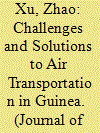

|
|
|
|
|
| Summary/Abstract |
After the dissolution of the first national airline in 2002, the Guinean government attempted to set up Guinea Airlines, but it was unsuccessful. This study aims to analyze the current state of air transport in Guinea and to conduct a diagnostic analysis for the revival of the national airline. The objective is to explore the causes of the failures of various attempts to revive the national company. The findings show that air transport has a positive spillover externality to economic long-run growth and the revival of Guinea Airlines could be a major asset to boost the country’s economic growth.
|
|
|
|
|
|
|
|
|
|
|
|
|
|
|
|
| 3 |
ID:
095349


|
|
|
|
|
| Publication |
2009.
|
| Summary/Abstract |
In the last five years China has dramatically increased its presence in Africa. Despite its abundant natural resources, the notoriety of its political regime and its close relationship with Beijing, Equatorial Guinea is a glaring omission in the China-Africa literature. This article intends to fulfil that gap by analysing the bilateral relationship between Beijing and Malabo at both the official and the social levels to assess its impact on the development of Equatorial Guinea. As bad governance is the main obstacle for the development of Equatorial Guinea, the article compares the role played by Chinese companies and government in reinforcing Obiang's authoritarian regime with that played by their Western counterparts. It concludes that Chinese extractive firms play a marginal role in the financial extraversion that strongly links the Obiang regimen with US oil companies. Conversely, the Chinese government offers Obiang more extensive and stable support than Western governments to the extent that most of the undeniable developmental potential of Chinese co-operation is wasted through clientelist networks.
|
|
|
|
|
|
|
|
|
|
|
|
|
|
|
|
| 4 |
ID:
120047


|
|
|
|
|
| Publication |
2013.
|
| Summary/Abstract |
Many experts argue that climate change will exacerbate the severity and number of extreme weather events. Such climate-related hazards will be important security concerns and sources of vulnerability in the future regardless of whether they contribute to conflict. This will be particularly true where these hazards put large numbers of people at risk of death, requiring the diversion of either domestic or foreign military assets to provide humanitarian relief. Vulnerability to extreme weather, however, is only partially a function of physical exposure. Poor, marginalized communities that lack access to infrastructure and services, that have minimal education and poor health care, and that exist in countries with poor governance are likely to be among the most vulnerable. Given its dependence on rainfed agriculture and its low adaptive capacity, Africa is thought to be among the most vulnerable continents to climate change. That vulnerability, however, is not uniformly distributed. Indicators of vulnerability within Africa include the historic incidence of climate-related hazards, population density, household and community resilience, and governance and political violence. Among the places in Africa most vulnerable to the security consequences of climate change are parts of the Democratic Republic of the Congo, Guinea, Sierra Leone, Somalia, and South Sudan.
|
|
|
|
|
|
|
|
|
|
|
|
|
|
|
|
| 5 |
ID:
098124


|
|
|
| 6 |
ID:
061639


|
|
|
| 7 |
ID:
104680
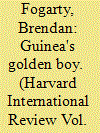

|
|
|
| 8 |
ID:
107881


|
|
|
| 9 |
ID:
139237


|
|
|
|
|
| Summary/Abstract |
Improving state–citizen relations at the local level is posited as one of the pathways out of fragility towards peace and stability. This article explores this premise by examining the experience of a recent donor-funded project in Guinea that combined improvements in sectoral service delivery with new modes of collaborative governance between local officials and communities. The analysis finds that the project’s focus on citizen engagement with local officials, coupled with transparency and mutual accountability, led to better services, changed attitudes and increased trust. Individual agency and leadership emerged as important success factors. Prospects for sustainability of these local reforms are challenged by Guinea’s weak state capacities and poverty. Lessons for donors include supporting stability-enhancing governance through incremental interventions that create relationships and coalitions among local actors.
|
|
|
|
|
|
|
|
|
|
|
|
|
|
|
|
| 10 |
ID:
164218
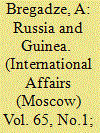

|
|
|
|
|
| Summary/Abstract |
WHEN we talk about the 60 years' sovereignty of the Republic of Guinea (Guinea) in its present borders, we mean "French Guinea," which was a "separate" colony within the federation of French West Africa with its capital in Dakar (now the capital of Senegal) from 1895 to 1958.
|
|
|
|
|
|
|
|
|
|
|
|
|
|
|
|
| 11 |
ID:
093129


|
|
|
| 12 |
ID:
092989


|
|
|
| 13 |
ID:
138403


|
|
|
|
|
| Summary/Abstract |
Almost six months after the peak of the West African Ebola outbreak, it is becoming hard to remember the panic and confusion that gripped the United States during the summer and fall of 2014. Using models that have since been discredited, the Centers for Disease Control tentatively projected that there would be up to half a million cases by January 2015. Health care workers returning from the affected region were threatened with involuntary quarantine, and schoolchildren with connections to African countries thousands of miles from the outbreak were asked to stay home. The United Nations passed a unanimous resolution declaring Ebola a “threat to international peace”; meanwhile, US President Barack Obama determined that only a military response could manage the logistics of containing the epidemic. The media focused relentlessly on the heroism of European and American responders and fell back on stock images of Africans as helpless, hapless victims who were nonetheless stubbornly resistant to Western medicine, irrationally carrying on with “secret burials,” and then getting on planes and spreading the disease to unsuspecting places like Dallas.
|
|
|
|
|
|
|
|
|
|
|
|
|
|
|
|
| 14 |
ID:
073994


|
|
|
|
|
| Publication |
2006.
|
| Summary/Abstract |
The Liberian civil war was the major issue in US-Guinea relations between 1990 and 2003. During the first half of this period, the US sought with limited success to secure Guinea's cooperation in finding a diplomatic solution. President Conté viewed Charles Taylor as Guinea's implacable enemy and authorised arms support for anti-Taylor factions, while the US pressed for a negotiated peace. The Guinean leader's negative reaction to US criticism of the flawed 1993 presidential elections halted most dialogue on Liberia for the next two years. When Taylor continued supporting civil war in Sierra Leone after 1997, and fighters allied to him assaulted Guinea border posts in 1999, the US strengthened its engagement with Guinea. Providing military training and non-lethal equipment, it sought to counter the threat that Guinea would succumb to the destabilisation which had afflicted Liberia and Sierra Leone. The US appears positioned to play a positive role in Guinea's political and economic transition after the departure from the scene of the seriously ill Guinean president.
|
|
|
|
|
|
|
|
|
|
|
|
|
|
|
|
| 15 |
ID:
133680
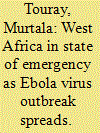

|
|
|
|
|
| Publication |
2014.
|
| Summary/Abstract |
The World Health Organization (WTO) declared on 8 August that the Ebola virus disease (EVD) outbreak in West Africa was "an international emergency" since the outbreak began, more than 1800 cases of EVD have been identified (Including new, confirmed, probable, and suspected cases) in Guinea, Liberia, Nigeria and Sierra Leone of which more than 1000 produced fatalities
|
|
|
|
|
|
|
|
|
|
|
|
|
|
|
|
| 16 |
ID:
152745
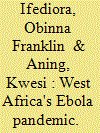

|
|
|
|
|
| Summary/Abstract |
The Ebola virus disease (EVD) outbreak in West Africa in 2014 became the region's most dangerous pandemic in history. Initially misdiagnosed by health authorities in Liberia, Guinea, and Sierra Leone, the epicenters of the crises, the wider health infrastructure of the international community similarly failed to grasp the enormity of the challenge posed by this pandemic to West Africa and its potential global ramifications. By the time recognition dawned about the immensity of the challenges that were posed by this pandemic, it took the introduction of extraordinary measures through the characterization of the disease as a threat to international peace and security pursuant to Chapter VII of the UN Charter to get the necessary institutional and bureaucratic machineries to intervene. This article argues that EVD, disastrous in its outcome, exposed the weaknesses and failures of existing institutional frameworks at national, regional, and continental to global levels. Focusing primarily on multilateral responses (the UN, the African Union [AU], and the Economic Community of West African States [ECOWAS]) to the epidemic, this article argues for enhanced global-regional collaboration in the context of the UN Charter's Chapter VIII for more effective future responses to health crises in West Africa. This article contributes to the ongoing debate on the reform of global health governance by analyzing the existing health governance strategies established by ECOWAS and implemented through the West African Health Organization.
|
|
|
|
|
|
|
|
|
|
|
|
|
|
|
|
|
|
|
|
|